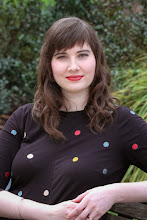About Me

- Rachel E. Watson
- I think, read and write. I might review books, mull on music, spin original poems, share insights or tell stories, but you can be sure whatever you read here comes from a thoughtful and considered place within.
Popular Posts
-
Anne Shirley and Gilbert Blythe. For women of my generation, before we were old enough to even know ourselves, there was the love st...
-
This is my home office, where I do my writing each morning. I go through phases where I hate mornings. Where mornings are The Devil, ...
-
I have noticed some writers squirm when the word "prolific" is used to describe them. Why is this? I also have noticed some o...





